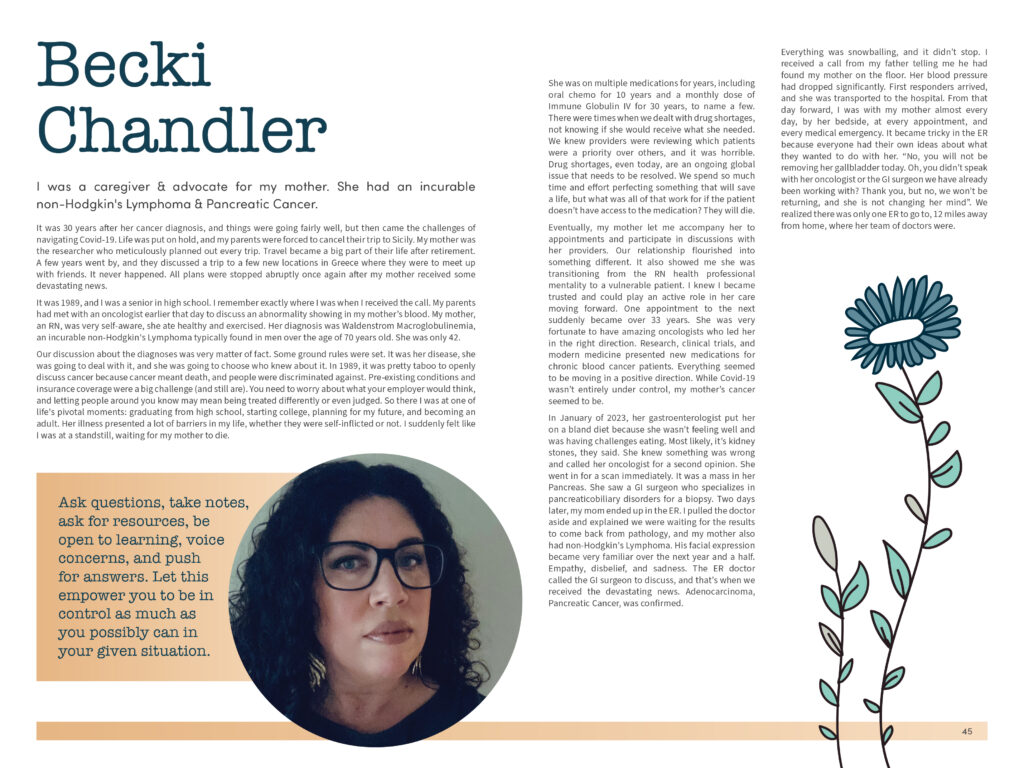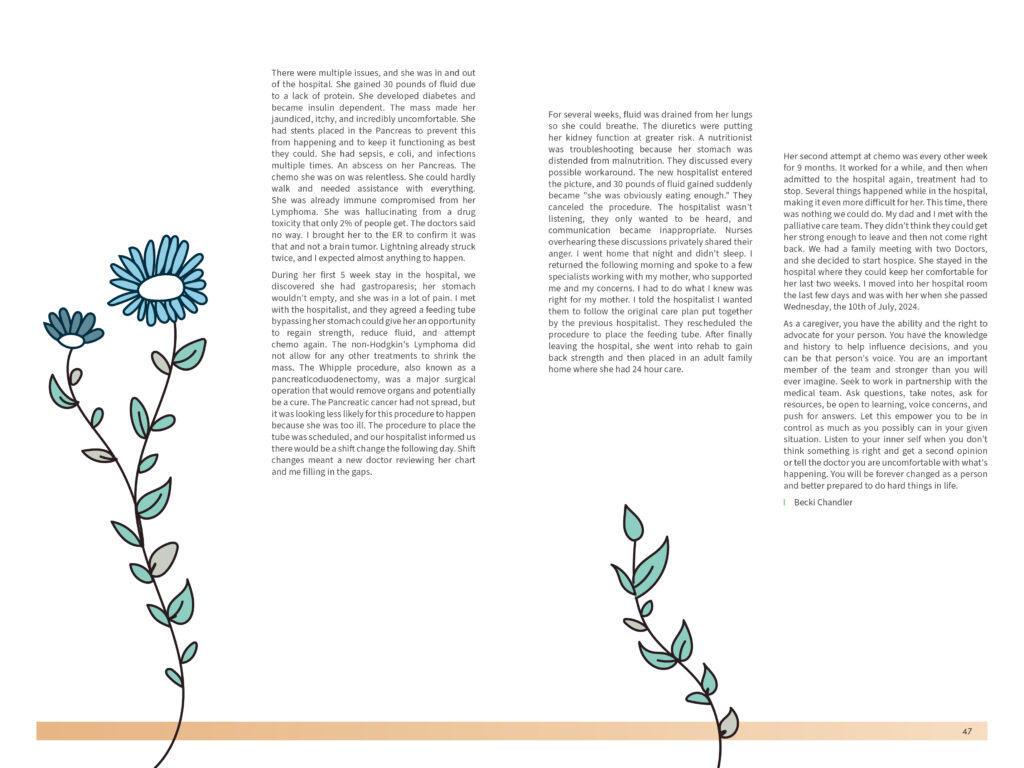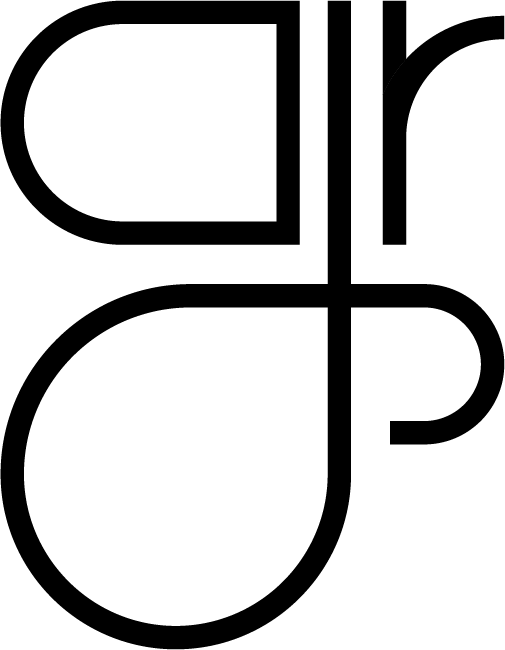I was a caregiver & advocate for my mother. She had an incurable non-Hodgkin’s Lymphoma & Pancreatic Cancer.
It was 30 years after her cancer diagnosis, and things were going fairly well, but then came the challenges of navigating Covid-19. Life was put on hold, and my parents were forced to cancel their trip to Sicily. My mother was the researcher who meticulously planned out every trip. Travel became a big part of their life after retirement. A few years went by, and they discussed a trip to a few new locations in Greece where they were to meet up with friends. It never happened. All plans were stopped abruptly once again after my mother received some devastating news.
It was 1989, and I was a senior in high school. I remember exactly where I was when I received the call. My parents had met with an oncologist earlier that day to discuss an abnormality showing in my mother’s blood. My mother, an RN, was very self-aware, she ate healthy and exercised. Her diagnosis was Waldenstrom Macroglobulinemia, an incurable non-Hodgkin’s Lymphoma typically found in men over the age of 70 years old. She was only 42.
Our discussion about the diagnoses was very matter of fact. Some ground rules were set. It was her disease, she was going to deal with it, and she was going to choose who knew about it. In 1989, it was pretty taboo to openly discuss cancer because cancer meant death, and people were discriminated against. Pre-existing conditions and insurance coverage were a big challenge (and still are). You need to worry about what your employer would think, and letting people around you know may mean being treated differently or even judged. So there I was at one of life’s pivotal moments: graduating from high school, starting college, planning for my future, and becoming an adult. Her illness presented a lot of barriers in my life, whether they were self-inflicted or not. I suddenly felt like I was at a standstill, waiting for my mother to die.
She was on multiple medications for years, including oral chemo for 10 years and a monthly dose of Immune Globulin IV for 30 years, to name a few. There were times when we dealt with drug shortages, not knowing if she would receive what she needed. We knew providers were reviewing which patients were a priority over others, and it was horrible. Drug shortages, even today, are an ongoing global issue that needs to be resolved. We spend so much time and effort perfecting something that will save a life, but what was all of that work for if the patient doesn’t have access to the medication? They will die.
Eventually, my mother let me accompany her to appointments and participate in discussions with her providers. Our relationship flourished into something different. It also showed me she was transitioning from the RN health professional mentality to a vulnerable patient. I knew I became trusted and could play an active role in her care moving forward. One appointment to the next suddenly became over 33 years. She was very fortunate to have amazing oncologists who led her in the right direction. Research, clinical trials, and modern medicine presented new medications for chronic blood cancer patients. Everything seemed to be moving in a positive direction. While Covid-19 wasn’t entirely under control, my mother’s cancer seemed to be.
In January of 2023, her gastroenterologist put her on a bland diet because she wasn’t feeling well and was having challenges eating. Most likely, it’s kidney stones, they said. She knew something was wrong and called her oncologist for a second opinion. She went in for a scan immediately. It was a mass in her Pancreas. She saw a GI surgeon who specializes in pancreaticobiliary disorders for a biopsy. Two days later, my mom ended up in the ER. I pulled the doctor aside and explained we were waiting for the results to come back from pathology, and my mother also had non-Hodgkin’s Lymphoma. His facial expression
became very familiar over the next year and a half. Empathy, disbelief, and sadness. The ER doctor called the GI surgeon to discuss, and that’s when we received the devastating news. Adenocarcinoma, Pancreatic Cancer, was confirmed.
Everything was snowballing, and it didn’t stop. I received a call from my father telling me he had found my mother on the floor. Her blood pressure had dropped significantly. First responders arrived, and she was transported to the hospital. From that day forward, I was with my mother almost every day, by her bedside, at every appointment, and every medical emergency. It became tricky in the ER because everyone had their own ideas about what they wanted to do with her. “No, you will not be removing her gallbladder today. Oh, you didn’t speak with her oncologist or the GI surgeon we have already been working with? Thank you, but no, we won’t be returning, and she is not changing her mind”. We realized there was only one ER to go to, 12 miles away from home, where her team of doctors were.
There were multiple issues, and she was in and out of the hospital. She gained 30 pounds of fluid due to a lack of protein. She developed diabetes and became insulin dependent. The mass made her jaundiced, itchy, and incredibly uncomfortable. She had stents placed in the Pancreas to prevent this from happening and to keep it functioning as best they could. She had sepsis, e coli, and infections multiple times. An abscess on her Pancreas. The chemo she was on was relentless. She could hardly walk and needed assistance with everything. She was already immune compromised from her Lymphoma. She was hallucinating from a drug toxicity that only 2% of people get. The doctors said no way. I brought her to the ER to confirm it was that and not a brain tumor. Lightning already struck twice, and I expected almost anything to happen.
During her first 5 week stay in the hospital, we discovered she had gastroparesis; her stomach wouldn’t empty, and she was in a lot of pain. I met with the hospitalist, and they agreed a feeding tube bypassing her stomach could give her an opportunity to regain strength, reduce fluid, and attempt chemo again. The non-Hodgkin’s Lymphoma did not allow for any other treatments to shrink the mass. The Whipple procedure, also known as a pancreaticoduodenectomy, was a major surgical operation that would remove organs and potentially be a cure. The Pancreatic cancer had not spread, but it was looking less likely for this procedure to happen because she was too ill. The procedure to place the tube was scheduled, and our hospitalist informed us there would be a shift change the following day. Shift changes meant a new doctor reviewing her chart and me filling in the gaps.
For several weeks, fluid was drained from her lungs so she could breathe. The diuretics were putting her kidney function at greater risk. A nutritionist was troubleshooting because her stomach was distended from malnutrition. They discussed every possible workaround. The new hospitalist entered the picture, and 30 pounds of fluid gained suddenly became “she was obviously eating enough.” They canceled the procedure. The hospitalist wasn’t listening, they only wanted to be heard, and communication became inappropriate. Nurses overhearing these discussions privately shared their anger. I went home that night and didn’t sleep. I returned the following morning and spoke to a few specialists working with my mother, who supported me and my concerns. I had to do what I knew was right for my mother. I told the hospitalist I wanted them to follow the original care plan put together by the previous hospitalist. They rescheduled the procedure to place the feeding tube. After finally leaving the hospital, she went into rehab to gain back strength and then placed in an adult family home where she had 24 hour care.
Her second attempt at chemo was every other week for 9 months. It worked for a while, and then when admitted to the hospital again, treatment had to stop. Several things happened while in the hospital, making it even more difficult for her. This time, there was nothing we could do. My dad and I met with the palliative care team. They didn’t think they could get her strong enough to leave and then not come right back. We had a family meeting with two Doctors, and she decided to start hospice. She stayed in the hospital where they could keep her comfortable for her last two weeks. I moved into her hospital room the last few days and was with her when she passed Wednesday, the 10th of July, 2024.
As a caregiver, you have the ability and the right to advocate for your person. You have the knowledge and history to help influence decisions, and you can be that person’s voice. You are an important member of the team and stronger than you will ever imagine. Seek to work in partnership with the medical team. Ask questions, take notes, ask for resources, be open to learning, voice concerns, and push for answers. Let this empower you to be in control as much as you possibly can in your given situation. Listen to your inner self when you don’t think something is right and get a second opinion or tell the doctor you are uncomfortable with what’s happening. You will be forever changed as a person and better prepared to do hard things in life.


Are you ready to share your story of RESILIENCE? You can do that HERE.
